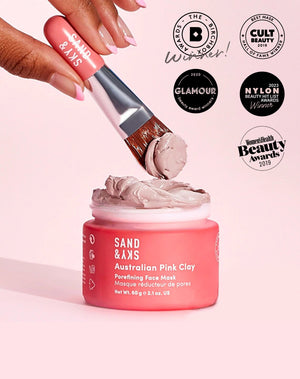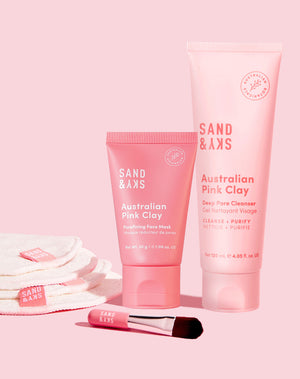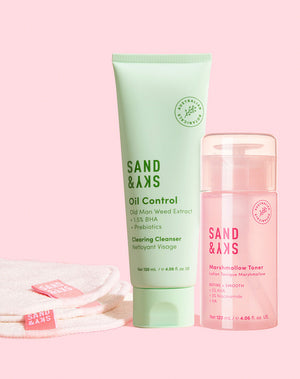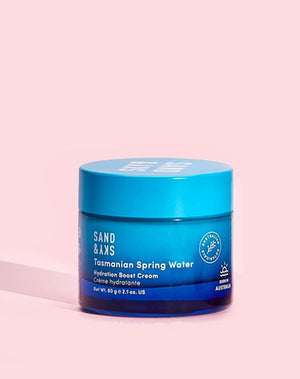Why a Healthy Skin Barrier Is the Key to Healthy Skin
If you’re interested in skincare (and we’re assuming you are if you’ve landed here), you’ve no doubt heard of the skin barrier. Like slugging and skinimalism, the skin barrier is a hot topic among social media skincare communities. And, unlike many fleeting trends, this is one dermatological obsession guaranteed to stick around.
But what is your skin barrier, exactly? And why is it so important? From impairment to repairment and everything in between, this is your bumper barrier guide. Read on to learn how to protect your precious skin barrier – and why you should even bother in the first place.
What is the skin barrier?
Also known as the moisture barrier, the skin barrier is a vital part of happy, healthy skin. If it functions well your skin will be soft, plump, and glowing. If it’s damaged – well, we’ll get into that in a moment. But let’s just say your skin will look and feel less than its best.
The skin barrier is found in the stratum corneum – the outermost layer of your epidermis (top skin layer). It consists of skin cells held together by fatty, waxy, or oily compounds known as lipids. Think of your skin cells as bricks – and ceramides, cholesterol and fatty acids as the mortar that glues everything together. Together, they create a protective barrier to keep irritants out while locking in hydration.
What are the signs your barrier is impaired?
Is your skin sensitive and prone to flushing and redness? These are symptoms and signs of a damaged barrier. Ditto dryness, dullness, and dehydration. Plus, rough patches and tight, itchy, or uncomfortable sensations. Like skin that stings even when applying non-active skincare products or sunscreen.
When the skin barrier is damaged, the skin is less able to retain precious moisture. An increase in trans-epidermal water loss (TEWL) leaves the skin looking lacklustre. And it can also worsen skin conditions like eczema and psoriasis.
At the same time, the skin’s also less able to defend itself from external aggressors – like UV, pollution, and chemicals. More susceptible to inflammation and irritation, the skin may show signs of premature ageing. If you struggle with acne, your breakouts will often become more frequent and severe.
What can damage it?
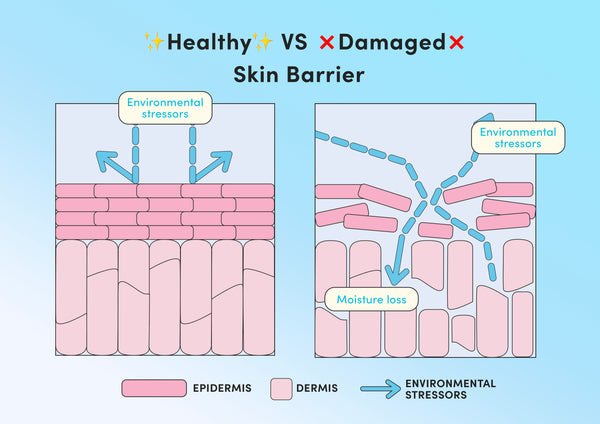
So, what’s caused your skin barrier to become impaired? A range of internal and external factors could be to blame – starting with your skincare habits.
The bugbear of every dermatologist, over-exfoliation and aggressive use of active ingredients like retinol and acids (glycolic acid, salicylic acid etc) are common culprits. While these ingredients have amazing benefits, it’s important to build up tolerance gradually. And be careful when combining in your skincare regime.
Other factors impacting the skin barrier include UV radiation, pollution exposure and an overly dry or humid climate. Your genes also play a part – and so does your lifestyle. Stress, lack of sleep, smoking? They’re not doing your barrier any favours. You’ll also want to avoid overly hot water. And be aware that steroids and certain medications can weaken your skin’s defences and cause a weak skin barrier.
How to build a barrier-friendly skincare routine
Whether you’re rebuilding a compromised barrier or simply want to support your skin, a barrier-friendly skincare routine will help.
Step 1: Keep it simple
As dermatopharmacology professor, Dr Christian Surber tells The New York Times, “The 10-step Korean regimen is an ordeal for the skin.” Meaning? The first thing a dermatologist will recommend to repair skin barriers is a basic, pared-back routine.
Skip (or reduce the use of) your retinoids, hydroxy acids and manual exfoliants for a few weeks. Instead, try a simple routine that focuses on restoring hydration. Think gentle cleanser, a hydrating serum and moisturiser.
Look for a serum containing hyaluronic acid, such as our Tasmanian Spring Water Splash Serum. This naturally occurring molecule famously helps the skin retain water. In our serum, it’s also paired with minerals, probiotics and fermented sea kelp for further barrier support.
Step 2: Replenish and rebuild
To support or repair the skin barrier, incorporate hydrating, soothing and nourishing ingredients into your routine. Hyaluronic acid, ceramides, niacinamide and pro-vitamin B5 (panthenol) are great additions. There are also some incredible ingredients found in nature – many of which you’ll find in our fortifying Tasmanian Spring Water range.
Alongside skin-strengthening minerals, hyaluronic acid and sea kelp, our Tasmanian Spring Water Hydration Boost Cream contains red seaweed extract. This amazing aquatic ingredient forms a ‘second skin’ to reduce water loss for healthy, balanced skin.
Step 3: Try slugging or masking overnight
If your skin’s feeling super thirsty, slugging can be a great way to lock in moisture overnight. This slimy-sounding practice refers to applying a thin layer of petroleum jelly over your moisturising products as the last step in your PM routine.
However, we’re not all down with the greasy sensation – and slugging’s off limits for the acne-prone. Another great barrier-boosting option is to apply a hydrating mask before bedtime – over your serum and moisturiser. Look for a product with super-hydrators like hyaluronic acid, squalene and Pentavitin. Such as? Our Tasmanian Spring Water Intense Hydrating Mask, which also contains fermented sea kelp and cornflower to help strengthen the skin barrier.
Step 4: Be vigilant about sun protection
As we’ve mentioned, the skin barrier plays a crucial protective role. Including filtering 60-70% of UVB rays1. Unfortunately, however, it can quickly become compromised with excess UV exposure. According to a 2012 study, “UV radiation poses a double threat to skin by both increasing the biomechanical driving force for damage while simultaneously decreasing the skin’s natural ability to resist.”
In other words? Excess sun exposure damages the stratum corneum, which then makes the skin’s barrier function – and ability to protect against UV – less effective.
As UV exposure is the number one cause of premature ageing2, you need to protect your skin barrier if you want it to protect YOU. And that means applying a broad-spectrum, high-SPF sunscreen each morning to delay the onset of fine lines, sagging and sunspots. Not to mention sunburn and skin cancer.
Step 5: Adjust your lifestyle
A healthy lifestyle is your skin barrier’s BFF. Try to manage stress, exercise regularly and get plenty of good-quality sleep. Also, look at your diet and alcohol consumption. And if you’re a smoker? Now's the time to butt out. For good.
The bottom line
Without a healthy skin barrier, calm, hydrated, glowing skin is simply a dream. Luckily, you can restore yours and breathe new life into your complexion with some simple routine and lifestyle swaps!
Written by: Pip Jarvis
Edited by: Celeste
